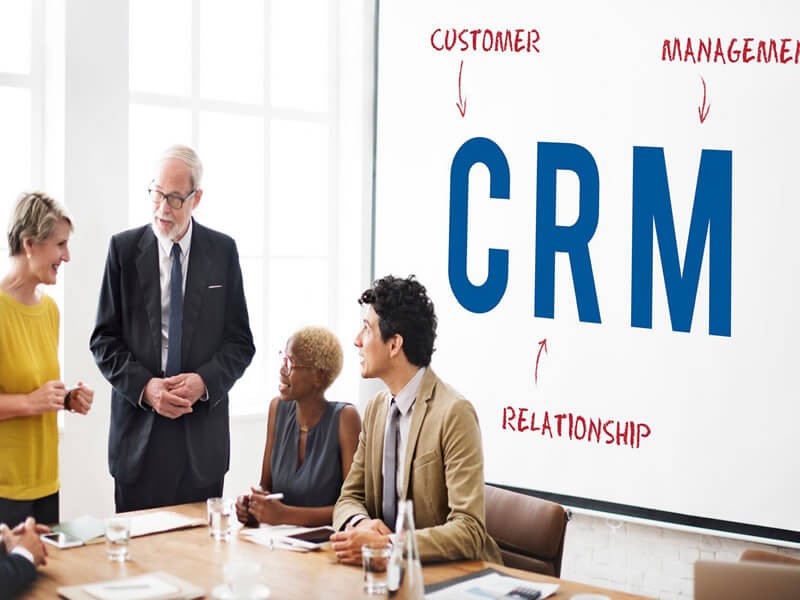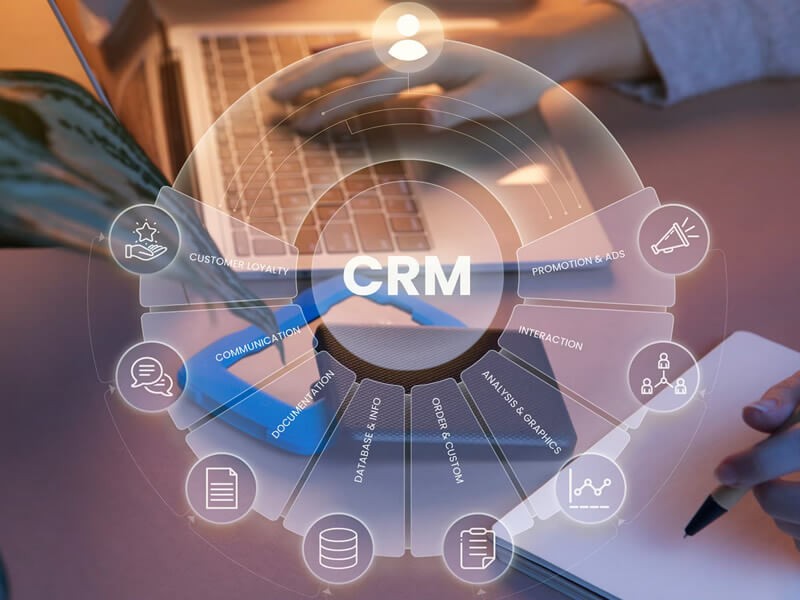Insight Blog
Agility’s perspectives on transforming the employee's experience throughout remote transformation using connected enterprise tools.
13 minutes reading time (2509 words)
Bespoke CRM System - Should You Build A Custom CRM?
Explore the ins and outs of bespoke CRM systems. Should your business go custom or stick with off-the-shelf solutions? Read on to find out!
A Customer Relationship Management system (CRM) is a suite of software and data tools crafted to gather customer information from various communication channels within your company. This encompasses your website, social media platforms, telephone networks, and direct mail marketing strategies.
By investing in a bespoke CRM system that precisely aligns with your business requirements, you can streamline and enhance the efficiency of your business operations. It enables you to swiftly identify and address customer inquiries while fostering cohesion across all facets of your company.
Can a bespoke CRM system be a good investment when you have off-the-shelf competitors like Oracle? This is a tough question to answer for businesses considering the benefits and drawbacks of custom build CRM solutions. Moreover, it requires significant money, time, and other resources.
This comprehensive guide highlights the bespoke CRM system's characteristics and why you should use it.
Bespoke CRM Systems - A Complete Guide
A bespoke CRM system is a customized Customer Relationship Management tool designed specifically to meet the unique requirements of a particular business.
Unlike off-the-shelf CRM solutions, which offer generic features to cater to a broad range of businesses, a bespoke CRM is tailored to align closely with your specific operational needs, customer interaction methods, and long-term business goals.
The primary purpose of a bespoke CRM is to streamline various business processes such as sales, marketing, and customer service, all while offering a high degree of flexibility, it's crucial to hire CRM developers who can customize the system. It enables businesses to store and manage customer data in a way that is most useful to them, making data-driven decision-making more straightforward.
By automating tasks and providing insightful analytics, it frees up your team to focus on what really matters: building meaningful relationships with customers and growing the business.
The end result? Increased efficiency, improved customer satisfaction, and a significant competitive advantage in the marketplace.
Check out: 7 Tips For Choosing The Right CRM Software
The Process to Build Custom CRM
Bespoke CRM development allows businesses to create a customized customer relationship management system tailored to their specific needs. Unlike off-the-shelf solutions, a bespoke CRM is designed to fit seamlessly into a company's workflow, ensuring efficiency and effectiveness.
This personalized approach ensures that the software meets all unique business requirements, providing a competitive advantage in the marketplace.
- Establish clear objectives before starting CRM development
- Determine user roles and access levels
- Prioritize security requirements
- Selecting the right development partner
- Obtaining a preliminary cost estimate
- Navigating the development phase
- Preparing for system launch
- Planning for post-project support and maintenance
Successful implementation is the linchpin of any bespoke CRM development project. It's not just about getting the software up and running; it's about ensuring that it integrates smoothly with existing systems and that your team is well-equipped to use it effectively.
A well-thought-out implementation plan, complete with training modules and a support structure, can significantly reduce the learning curve for your staff.
This step is critical for realizing the full benefits of your investment, ensuring that the CRM not only serves its functional purpose but also empowers your team to achieve long-term business objectives.
The Importance of Bespoke CRM Development in Today's Business Landscape
In the fast-paced, competitive world of modern business, staying ahead of the curve is no small feat. This is especially true when it comes to customer relationship management, a key pillar of business success. Enter bespoke CRM development, a personalized approach that is gaining traction and for good reason.
Why is a custom-built CRM so vital now? For starters, the world is more interconnected than ever. Customers have an abundance of choices, and their expectations are sky-high.
A generic CRM system often lacks the features and flexibility needed to meet these changing demands. On the flip side, a bespoke CRM is crafted to fit your unique business model, customer base, and operational intricacies. It allows you to deliver a personalized experience that resonates with your customers, setting you apart from the competition.
Businesses are becoming increasingly specialized. Whether you're in eCommerce, healthcare, or manufacturing, each industry has its specific needs and challenges.
A custom-built CRM can incorporate industry-specific tools and integrations that a one-size-fits-all system simply can't provide.
Follow us and access great exclusive content everyday: Follow us on Google News
Key Benefits of Opting for Bespoke CRM Solutions
1. Accurate Prediction of Customer Demands
Accurate prediction of customer needs is vital in today's business world, and good bespoke CRM solutions make this easier than ever. With quick access to key data like past purchases and interaction history, sales teams can not only meet but also anticipate customer demands.
This takes the guesswork out of sales, helping teams focus on what really matters. Knowing what a customer will likely want next helps tailor timely offers, leading to happier customers and more sales.
So, when you're thinking about CRM features, put predictive capabilities at the top of your list. It's not just a feature; it's a game-changer that can set you ahead in the market.
2. Enhanced Internal Communications
Opting for bespoke CRM solutions can do wonders for internal communication. When customer data is centralized, everyone on the team gets the same, up-to-date information.
This eliminates confusion and helps team members communicate clearly about customer needs and plans.
Transparency in customer dealings means everyone knows the status and next steps, avoiding mixed messages to clients. So, a custom CRM isn't just good for customer management; it also boosts team communication.
Once you tailor a CRM to your needs, you'll see better teamwork and improved business results. It's not just a feature; it's a game-changer for your whole organization.
3. Strengthening Client Loyalty Through Customization
Strengthening client loyalty is another significant advantage of investing in bespoke CRM solutions.
With customization at its core, your CRM can be tailored to provide a customer experience that's not just satisfactory but truly exceptional. Clients appreciate it when you remember their last purchase, inquire about their satisfaction, or even wish them on their birthday.
These small but impactful interactions become seamless with a customized CRM, making clients feel valued and understood.
So, if you're considering CRM functionalities, don't overlook the customization options that can significantly boost client loyalty. It's more than a feature; it's a long-term relationship builder that can drive repeat business and customer referrals.
Evaluating the Different Types of Bespoke CRM Solutions
Evaluating different types of bespoke Customer Relationship Management (CRM) solutions is a crucial process for businesses seeking to enhance their customer interactions and streamline their operations.
Businesses should start by clearly defining their specific needs and objectives. This involves identifying the key functionalities and features required to meet their unique business processes and customer engagement goals.
Next, it's important to assess the scalability of the CRM solution. As a business grows, its CRM needs may evolve, so the chosen system should be capable of accommodating future expansion and customization.
Additionally, evaluating the integration capabilities of the CRM is vital. It should seamlessly integrate with existing software systems and databases to ensure a smooth flow of data and information across the organization. Lastly, cost considerations are essential.
Businesses should compare the upfront and ongoing costs of different bespoke CRM solutions to ensure they align with their budget constraints. Here are 3 important factors to also consider.
Custom Operational CRM
Custom operational CRM focuses on automating and streamlining essential business processes such as sales, customer service, and marketing. But unlike off-the-shelf solutions, bespoke CRM solutions can be tailored to fit your organization's unique needs and workflows.
This customization ensures that you're not just working efficiently—you're working efficiently in a way that's specific to your business model.
Key features may include:
- Customizable Lead Management
- Tailored Contact Management
- Personalized Sales Pipelines
- Specialized Helpdesk Functions
Opting for a Custom Operational CRM allows you to go beyond the standard features, enabling a level of agility and responsiveness that generic systems may not offer.
You may also like: Best Apps for Employees: UPDATED 2022 – A Complete Guide
Tailor-Made Analytical CRM
Tailor-made analytical CRM is designed to gather extensive data from multiple touchpoints and transform it into actionable insights.
Unlike generic solutions, these custom systems are tailored to align with your unique business objectives. They serve a crucial role in strategic planning by providing in-depth statistics and analytics data that can inform your decisions.
One of the standout features of a tailor-made analytical CRM is its capability to deliver real-time data and analytics, a considerable advantage for businesses that need to make quick, data-driven choices.
With a customized analytical CRM, you get a tool that's not just powerful but also perfectly suited to your needs.
Custom-Built Collaborative CRM
Custom-built collaborative CRM is a powerhouse for team communication and cooperation.
This specialized system offers a clear window for sharing data, making sure everyone is on the same page. Features like group chats, shared boards, and easy file sharing are common. The real benefit is its transparency. Team members can effortlessly keep track of customer interactions and internal discussions.
What's even better? You can merge this with other CRM types to make a super-tool tailored to your business needs. In essence, a Custom-Built Collaborative CRM isn't just a tool; it's a team unifier that boosts efficiency.
Free ebook: How To Get Your Intranet Off The Ground
Understanding Bespoke CRM Solutions & Development
1. Aligning Business Goals with CRM Functionality
Before diving into CRM development, it's crucial to align the system with your business goals. Ask yourself, "What needs will this CRM cover?" For example, if you aim to cut costs, look for automation features. If strategy modification is your goal, analytics capabilities should be on your list.
Taking the time to match CRM functionalities with your business objectives not only streamlines operations but also sets you on a clearer path to success. It's not just about having a CRM; it's about having the right CRM that helps you achieve your goals.
2. Deciding on a Customized Feature Set
Setting clear goals is your first step. They will guide you in picking the features that will simplify your business operations. Once you know what you want, list these features.
This isn't just a wish list; it's your roadmap for the developers. Remember, the more features and the more complex they are, the higher the cost. So be smart about what you really need.
All these details should be well-documented to make sure you and your software engineers are on the same page. It's not just about building a system; it's about making it work for you.
3. Understanding CRM Roles Within Your Organization
When planning your CRM system, understanding the different roles within your organization is crucial.
By categorizing roles like sales, marketing, and support, you can tailor the CRM's functionality to fit each team's needs. This way, employees see only the features and data relevant to them, making their workflow smoother.
Plus, role-specific access adds an extra layer of security. It prevents any unintentional or unauthorized data sharing between departments, reducing the risk of data breaches. So, when setting up a CRM, think carefully about who needs to see what—it's both efficient and secure.
4. SaaS Platform vs. Custom-Built Internal Software
Choosing between a SaaS platform and custom-built internal software for your CRM needs isn't just a current decision; it's a future-focused one.
If you're considering eventually turning your in-house CRM into a SaaS offering, early planning is key. From the get-go, you should align your tech infrastructure to support this future shift.
This means thinking ahead about scalability, data management, and ease of access.
By planning for these elements in the first phase of CRM development, you're paving a smoother road for potentially transitioning into a SaaS model later on. It's not just about solving today's problems but setting the stage for tomorrow's opportunities.
5. Ensuring Quality Through Standards
Ensuring quality in your CRM system is a must, and a good way to start is by listing out key requirements.
Think about the speed at which the system needs to operate, the level of security access required, and the importance of built-in analytics and database integration.
Once you have these outlined, you can aim for compliance with recognized quality standards like ISO and ASTM. Meeting these standards not only adds a layer of credibility but also ensures that the system you build is robust and reliable.
It's not just a box to check; it's foundational for your CRM's success.
6. Preparing for Employee Onboarding
Getting a custom CRM is only half the battle; the other half is ensuring your team can actually use it effectively.
Before even searching for an IT company to build your CRM, decide who will manage it. Next, plan a robust training program that covers how to gather key business data, monitor customer interactions, and read analytics. If you overlook this critical step, you're risking failure right out of the gate.
Proper onboarding isn't an afterthought; it's a must-do that prepares your team for success.
How Much Does It Cost To Build A Custom CRM System?
The development of a custom CRM entails a variety of specialized roles and tasks. The estimated custom build CRM system cost is given below:
- Design: 400 hours
- Backend Development: 1300 hours
- Frontend Development: 600 hours
- Quality Assurance: 300 hours
- Project Management: 350 hours
- Documentation: 150 hours
The project would take approximately 3100 hours, roughly translating to a 5-6 month timeframe for completion. Assuming the average rate of $40 per hour for our developers, the total cost for this custom CRM would be around $124,000.
However, this cost could increase by 50-100% if you opt for IT firms based in the U.S. or Western Europe, where hourly rates generally range from $70-$100.
Final Verdict: Should You Build A Custom CRM Solution?
In the complex equation of deciding whether to build a custom CRM, several variables come into play, from cost to adaptability to long-term business goals.
This comprehensive guide has laid out the multifaceted benefits and considerations involved in developing a bespoke CRM system. The decision should be far from impulsive; it demands a thorough evaluation of your business needs, customer engagement strategy, and resource availability.
While the upfront costs and development time can be considerable, the payoffs in terms of operational efficiency, customer satisfaction, and competitive advantage can make it a worthy investment.
So, should you build a custom CRM? If your business requires a highly tailored approach to customer relationship management, the answer leans toward a resounding yes.
Categories
Blog (2676)
Business Management (328)
Employee Engagement (213)
Digital Transformation (179)
Growth (122)
Intranets (120)
Remote Work (61)
Sales (48)
Collaboration (40)
Culture (29)
Project management (29)
Customer Experience (26)
Knowledge Management (21)
Leadership (20)
Comparisons (7)
News (1)
Ready to learn more? 👍
One platform to optimize, manage and track all of your teams. Your new digital workplace is a click away. 🚀
Free for 14 days, no credit card required.















